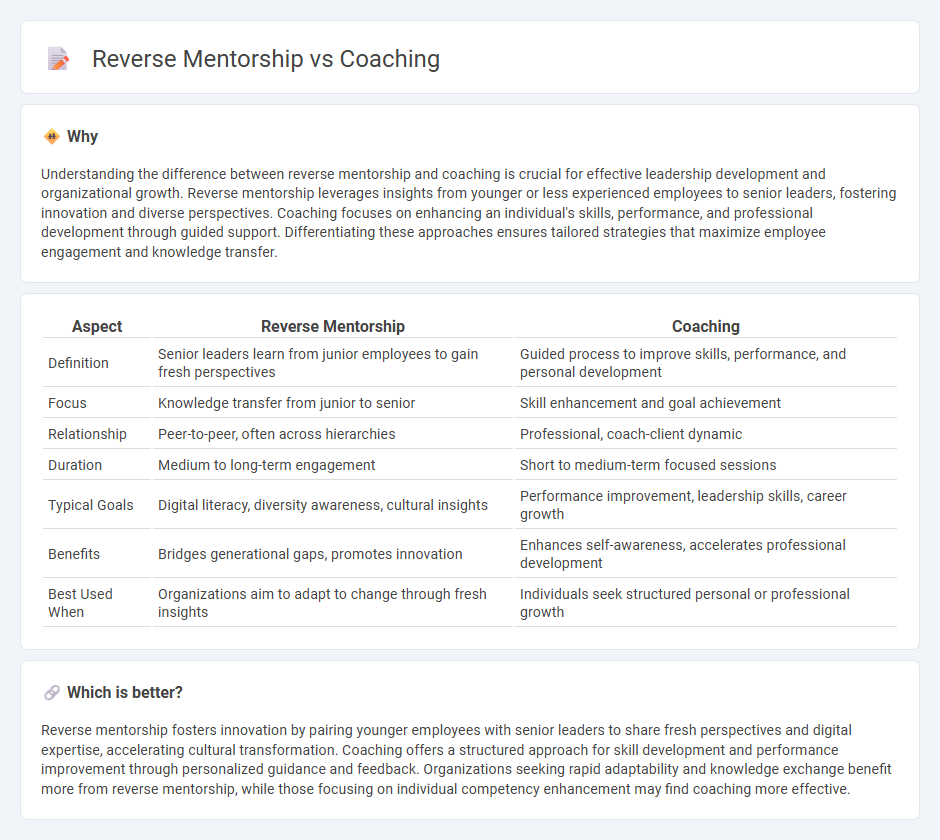
Reverse mentorship fosters innovative learning by pairing younger employees with senior leaders to exchange fresh perspectives and digital skills. Coaching emphasizes personalized development through goal-oriented guidance and feedback to enhance performance and leadership abilities. Explore how integrating reverse mentorship and coaching can transform your organizational growth strategies.
Why it is important
Understanding the difference between reverse mentorship and coaching is crucial for effective leadership development and organizational growth. Reverse mentorship leverages insights from younger or less experienced employees to senior leaders, fostering innovation and diverse perspectives. Coaching focuses on enhancing an individual's skills, performance, and professional development through guided support. Differentiating these approaches ensures tailored strategies that maximize employee engagement and knowledge transfer.
Comparison Table
| Aspect | Reverse Mentorship | Coaching |
|---|---|---|
| Definition | Senior leaders learn from junior employees to gain fresh perspectives | Guided process to improve skills, performance, and personal development |
| Focus | Knowledge transfer from junior to senior | Skill enhancement and goal achievement |
| Relationship | Peer-to-peer, often across hierarchies | Professional, coach-client dynamic |
| Duration | Medium to long-term engagement | Short to medium-term focused sessions |
| Typical Goals | Digital literacy, diversity awareness, cultural insights | Performance improvement, leadership skills, career growth |
| Benefits | Bridges generational gaps, promotes innovation | Enhances self-awareness, accelerates professional development |
| Best Used When | Organizations aim to adapt to change through fresh insights | Individuals seek structured personal or professional growth |
Which is better?
Reverse mentorship fosters innovation by pairing younger employees with senior leaders to share fresh perspectives and digital expertise, accelerating cultural transformation. Coaching offers a structured approach for skill development and performance improvement through personalized guidance and feedback. Organizations seeking rapid adaptability and knowledge exchange benefit more from reverse mentorship, while those focusing on individual competency enhancement may find coaching more effective.
Connection
Reverse mentorship fosters a dynamic learning environment where junior employees provide insights and fresh perspectives to senior leaders, enhancing leadership adaptability. Coaching complements this by offering structured guidance and feedback, helping mentees apply new knowledge effectively and develop critical skills. Together, reverse mentorship and coaching drive continuous personal development and organizational innovation.
Key Terms
Guidance
Coaching provides structured guidance through expert advice, goal-setting, and skill development, primarily driven by a more experienced individual. Reverse mentorship offers a fresh perspective by allowing less experienced employees to share insights, fostering mutual learning and innovative problem-solving. Explore how combining both approaches can enhance organizational growth and personal development.
Knowledge Transfer
Coaching involves experienced professionals sharing expertise to enhance skills, while reverse mentorship allows younger employees to impart fresh insights and digital know-how to senior leaders, fostering mutual learning and innovation. Both methods effectively facilitate knowledge transfer, bridging generational gaps within organizations and promoting continuous development. Explore more to understand how coaching and reverse mentorship can transform your workplace knowledge dynamics.
Mutual Learning
Coaching emphasizes knowledge transfer from an experienced mentor to a less experienced mentee, fostering skill development and leadership growth. Reverse mentorship inverts this dynamic, allowing younger or less experienced employees to share fresh perspectives and technological insights with senior leaders, promoting mutual learning. Explore the benefits of integrating both approaches to enhance organizational knowledge exchange.
Source and External Links
What Is Coaching? - MIT Human Resources - Coaching is a partnership between manager and employee focused on achieving goals by providing ongoing feedback, support, direction, and creating a motivating climate for performance improvement throughout the year.
What is Coaching? | SkillsYouNeed - Coaching is about helping someone unlock their own personal potential by asking the right questions, focusing on the individual's internal resources rather than providing expert answers.
What is Coaching? | Understanding Professional Coaching with ICF - Coaching is a creative and exploratory process that fosters personal and professional growth, helping people navigate challenges, pursue dreams, build confidence, and find balance in life.
 dowidth.com
dowidth.com